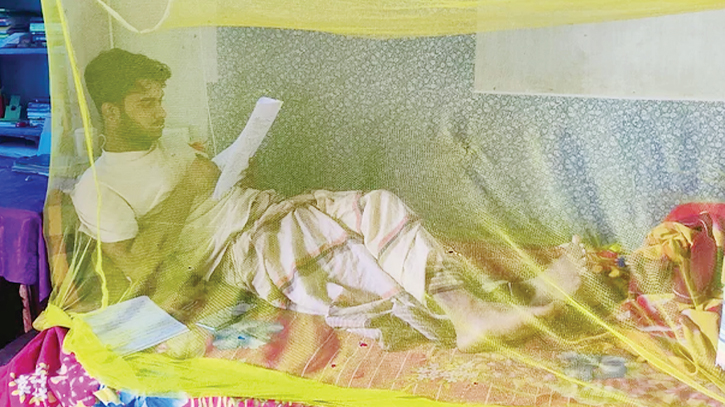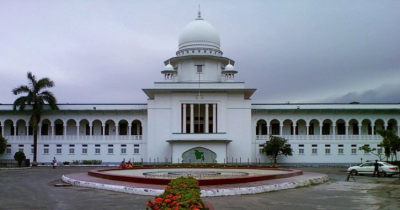
A student is studying under a mosquito net during the day to avoid mosquito infestation. This photo was taken on Friday at Amir Ali Hall of Rajshahi University. Photo: Messenger
The city of Rajshahi has been grappling with an unprecedented surge in mosquito population since February, causing distress among its residents. Mosquitoes have become ubiquitous, particularly after dusk, rendering outdoor activities almost unbearable due to incessant mosquito bites. Despite efforts by individuals to safeguard themselves using coils and aerosols, these measures have proven insufficient against the overwhelming mosquito onslaught, plunging the once normal life of Rajshahi's populace into misery.
The Rajshahi City Corporation initiated a special operation from February 28 to March 12 aimed at mosquito eradication within the metropolis. This endeavor included the use of larvicides year-round to target mosquito larvae, as well as periodic fogging operations using fogger machines during the breeding seasons in February-March and October-November. However, reports from the City Corporation's cleanliness department revealed that despite these efforts, mosquito numbers remained unaffected, if not exacerbated, particularly as winter transitioned to summer.
Residents from various city sectors lamented the ineffective nature of the fogging campaigns, noting a persistent rise in mosquito activity. They described resorting to mosquito nets as a daily necessity and employing various other measures to repel mosquitoes, albeit with limited success. Some, like Saidur Rahman from Ward No. 30, expressed concerns about the adverse effects of relying on coils due to their environmental and health hazards, indicating a growing resistance among mosquitoes to conventional insecticides.
Students, like Shihabul Islam from Rajshahi University, voiced their struggles with studying amidst the mosquito onslaught, experiencing discomfort and distractions from mosquito-induced rashes and bites. The university environment was described as particularly challenging, with inadequate cleaning measures in residential halls, classrooms, and administrative buildings exacerbating mosquito breeding grounds. The university administration cited resource constraints, including staffing shortages and budgetary limitations, hindering effective mosquito control efforts.
Medical professionals, such as Dr. Tabibur Rahman Sekh from the university's medical center, warned of the potential for mosquito-borne diseases to proliferate if the situation persisted unchecked. He emphasized the urgent need for widespread insecticide spraying to curb the spread of diseases like dengue and chikungunya, especially within the university campus.
While the City Corporation assured ongoing efforts in mosquito control, acknowledging the adverse effects of pesticide fumes, they emphasized the importance of community involvement in mitigating mosquito breeding. They stressed the need for collective awareness and action to identify and eliminate mosquito breeding sites effectively.
Despite concerted efforts by authorities, Rajshahi continues to grapple with a mosquito crisis that threatens public health and well-being. Urgent and sustained action, both at the institutional and community levels, is necessary to address this pressing issue and prevent the escalation of mosquito-borne diseases.
Messenger/Faria








